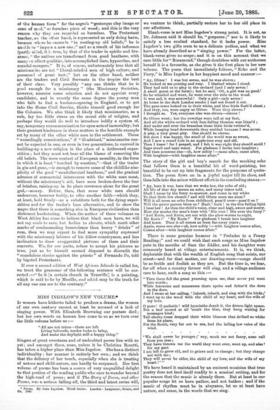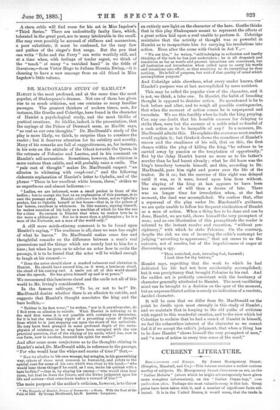MISS INGELOW'S NEW VOLUME:* Is women have hitherto failed to
produce a drama, the women of our own century cannot at least be accused of a lack of singing power. With Elizabeth Browning our poetess died ; but her own words on human loss come to us as we turn over the little volume before us :—
" All are not taken—there are left Living beloveds, tender looks to bring,
And make the daylight still a happy thing."
Singers of great sweetness and of undoubted power live with us yet ; and amongst these, none, unless it be Christina Rosetti, has taken a higher place than Miss Ingelow. She has a distinct individuality ; her manner is entirely her own ; and we think that the delicacy of her touch, especially when she is treating of nature and child-nature, can hardly he surpassed. Her first volume of poems has been a source of very unqualified delight to that portion of the reading public who care to wander beyond the high-road of prose; and if The Story of Doom, and other Poems, was a serious falling-off, the third and latest series will, we venture to think, partially restore her to her old place in our affections.
Blank-verse is not Miss Ingelow's strong point. It is not, as Dr. Johnson said it should be, "gorgeous ;" nor is it likely to satisfy a less exalted standard, for it lacks power. Miss Ingelow's two gifts seem to us a delicate pathos, and what we have already described as a "singing power." For the latter, blank-verse gives no scope; and it is on this account that we care little for" Rosamund," though doubtless with our authoress herself it is a favourite, as she gives it the first place in her new volume. The poem that immediately follows, "Echo and the Ferry," is Miss Ingelow in her happiest mood and manner :— "Ay, Oliver ! I was but seven, and he was eleven ;
He looked at me pouting and rosy. I blushed where I stood.
They had told us to play in the orchard (and I only seven ! A small guest at the farm) ; but he said, 06, a girl was no good.'
So he whistled and went, he went over the stile to the wood.
It was sad, it was sorrowful ! Only a girl—only seven !
At home in the dark London smoke I had not found it out.
The pear-trees looked on in their white, and blue birds flash'd about ; And they, too, were angry as Oliver. Were they eleven ?
I thought so. Yes, everyone else was eleven—eleven !
So Oliver went ; but the cowslips were tall at my feet,
And all the white orchard with fast-falling blossom was litter'd ; And under and over the branches those little birds twitter'd, While hanging head downwards they scolded because I was seven. A pity, a very great pity. One should be eleven.
But soon I was happy, the smell of the world was so sweet, And I saw a round hole in an apple-tree rosy and old.
Then I knew ! for I peeped, and I felt it was right they should scold ! Eggs small and eggs many. For gladness I broke into laughter; And then someone else—oh, how softly !—oame after, came after, With laughter—with laughter came after."
The story of the girl and boy's search for the mocking echo that follows them is a beautiful bit of word-painting, too beautiful to be cut up into fragments for the purposes of quotation. The poem flows on in a joyful major till its close, and then falls into the minor without effort in its concluding st9n7a -
"Ay, here it was, here that we woke her, the echo of old;
All life of that day seems an echo, and many times told.
Shall I cross by the ferry to-morrow, and come in my white To that little low church ? and will Oliver meet me anon?
Will it all seem an echo from childhood, pawed over—pass'd on ?
Will the grave parson bless us ? Hark ! hark! in the dim failing light I hear her ! As then the child's voice, clear and high, sweet and merry.
How she mocks the man's tone with Hie over ! lie over the ferry !'
And Katie, and Katie, art out with the glovv.worme to-night, My Katie?' ' My Katie !' For gladness I break into laughter And tears. Then it all comes as from far-away years ; Again, some one else—oh, bow softly !—with laughter comas after, Comes after—with laughter comes after."
There is some genuine humour in "Preludes to a Penny Reading ;" and we could wish that such songs as Miss Ingelow puts in the months of Sam the fiddler, and his daughter were commonly heard at village entertainments. It is, we think, deplorable that with the wealth of English song that exists, our street—and for that matter, our drawing-room—songs should be as feeble and foolish as they are. Bat the time is, we fear, far off when a country farmer will sing, and a village audience care to hear, such a song as this :—
"Then there fell the great yearning upon me, that never yet went into words ;
While lonesome and moansome there spake and falter'd the dove to the dove.
And I came at her calling, 'Inherit, inherit, and sing with the birchtf I went up to the wood with the child of my heart, and the wife of my love.
0 pure! 0 pathetic ! wild hyacinths drankit, the dream-light apace. Not a leaf moved at all 'neath the blue, they hung waiting for messages kind ; Tall cherry-trees dropped their white blossom that drifted no white from its place, For the South, very far .out to sea, had the lulling low voice of the wind.
'We shall never be younger;' nay, mock me not fancy, none call from you tree ;
They have thrown me the world they went over, went up, and alas! for my part I am left to grow old, and to grieve and to change ; but they change not with me ; They will never be older, the child of my love, and the wife of my heart !' "
We have heard it maintained by an eminent musician that true poetry does not lend itself readily to a musical setting, and for the reason that the music is already there. But at least in our popular songs let us have pathos, and not bathos ; and if the music of rhythm must be in abeyance, let us at least have nature, and sense, in the words that we sing.
A stern critic will find room for his art in Miss Ingelow's "Third Series." There are undoubtedly faulty lines, which, tolerated in the great poet, are to many intolerable in the small. She may even possibly be accused of stiffness and mannerism, a poor substitute, it must be confessed, for the easy flow and pathos of the singer's first songs. But the pen that can write "Echo and the Ferry" can write worthily still, and at a time when, with feelings of tender regret, we think of the "touch" of many "a vanished hand" in the fields of literature,—from Victor Hugo to Juliana Horatia Ewiug,—it is cheering to have a new message from an old friend in Miss Ingelow's little volume.



































 Previous page
Previous page